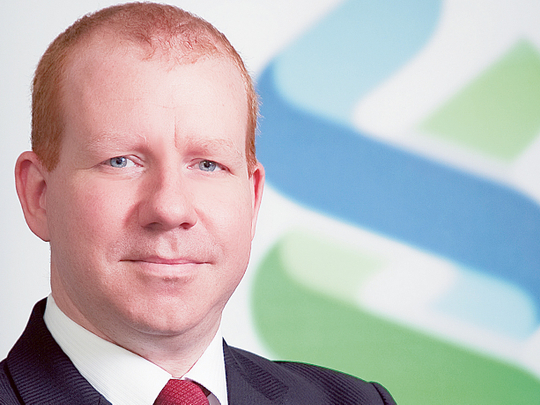
Dubai: The year 2016 has begun with high volatility on global equity markets continuing the heightened volatility in 2015. While the markets are expected to experience turbulence for a good part of the year, investors need to protect themselves through diversification across uncorrelated asset classes, Steve Brice, Chief Investment Strategist at Standard Chartered said in an Interview.
“While we enter the year bullish on the dollar, bearish on oil prices, expecting emerging markets to underperform and global equities to outperform, our view is that some of these trends may change as the year unfolds. For instance we expect oil prices to bottom, dollar strength to become much narrower and expect to see increased volatility as well,” said Brice.
On the macroeconomic front the global economy is forecast to continue growing but the key decision investors have to make is where the US economy stands in the economic cycle, according to Brice.
Going by the current indicators, Brice believes global equity markets including the US, Europe and Japan are expected to deliver positive returns this year. But the overall performance of equities will largely depend on the sustainability of US growth and the chances of US economy slipping into a recession.
Brice expects the current US economic expansion is likely to continue into 2017.
“Normally, US recessions are caused by the US Federal Reserve tightening its monetary policy to fighting inflation rather than supporting growth. Last year was characterised by strong disinflationary pressures. We expect the deflationary pressures to decline in 2016, but excessive capacity in Europe and China is likely to cap inflationary pressures globally. With modest inflationary pressures we expect the Fed to tighten monetary policy only gradually,” he said.
As the year unfolds he expects deflationary concerns to ebb as wage growth coming through in the first two quarters of the year. Additionally bottoming out of oil prices will push up inflationary pressures. Despite such changes in the macro environment, relatively weaker growth is expected to keep the rate tightening cycle shallow for the year. “We don’t expect more than two hikes for the full year, in all likelihood happening in the second half of the year,” said Brice.
In Europe and Japan, equities are expected to be supported by modest economic growth driven largely by accommodative monetary and fiscal policies. China is expected to face strong structural headwinds resulting in lower growth followed by mounting pressure on the currency and capital flight. A soft landing is expected on the back of strong policy easing. There is no reason to panic, but some more effective communication from Chinese authorities could calm the markets,” he said.
While emerging market earnings growth is expected to be modest, Brice is negative on ex-Asia emerging markets.
The Middle East economies are expected to face strong headwinds from low oil prices on the fiscal front and geopolitical uncertainties adversely impacting investments. Though the region is not facing massive capital flight, investors are cautious on committing money to the region.
“We believe that the geopolitics is more a serious concern for the region than low oil prices. We expect oil prices to bottom out this year climbing to $45 a barrel by the end of the year,” said Brice.
While 2016 promises to be another challenging year with high, global equity market returns are expected to be positive for the next 12-24 months. Brice recommends diversified approach, with a gradually increasing allocation to bonds, given our expectation for the Fed to hike interest rates only gradually.
Amid uncertainties investors need to balance the risk of potentially significant declines in risky asset classes such as equities and high yield bonds. “We believe investors can balance these conflicting pressures by maintaining a preference for global equities, but looking for ways to increasingly hedge against the risk of rising volatility,” said Brice.
Profile
Steve Brice is Chief Investment Strategist at Standard Chartered Bank, and an expert on the world economy and global markets. Based in Singapore, he is a key member of the Bank’s Global Investment Council, and also acts as an adviser to the Discretionary Portfolio Management division.
Steve has over 20 years of financial markets experience in senior positions, including previous roles as Head of Global Markets (Southern Africa), Head of Research (Middle East and South Asia) and Chief Economist (SE Asia), all with Standard Chartered Bank. He started his career at I.D.E.A. Ltd, a financial consultancy in London, where he was Regional Head of FX (Europe).







